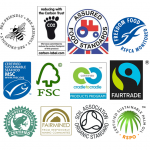I was in the foyer of the BBC yesterday and noticed that their stationery had arrived – cases of Evolve 100% recycled paper, exactly the same as I use. I was delighted. And then I thought, if even the BBC can do it (huge organisation, slow to change), then its really not hard. Why do we even use up as much trees and timber as we do right now to make paper in the first place?
Then I considered the endless dilemma about our resource usage. Did you know that in all our history, of all the gold we’ve mined from the earth, about 99% of it is now buried back in the earth in places like Fort Knox? What a total waste of energy and effort!
It’s not just gold – aluminium, iron ore, tantulum (mined in Africa for our mobile phones)… they are all mined, turned into products and then end up in land fill (or shipped back to China for poorly paid workers to try to separate and recycle – with no health and safety regulations to protect them from the toxic metals)
And it applies to paper too – yes, trees are renewable, but deforestation is a major issue, for many reasons, and illegal logging in places like south east Asia and South America is fueled by our insatiable need for timber products such as paper, cardboard etc. Much of which ends up in landfill, or with companies who struggle to create demand for a product that can appear more expensive and poorer quality (its not) than ‘fresh stuff’
So what do we do, to make ourselves use resources more wisely? Two options:
1) A totalitarian state – like in China, you can set the rules, set quotas and stick to them 🙁
2) Use the market economy – add a ‘nudge’ that will help the market reset itself to place more value on recycled products that new ones freshly mined or felled 🙂
I vote for option 2 – and there is a precedence. In the UK, there is a Primary Aggregate Tax on quarried stone and rock. This, combined with an increasing landfill tax, has resulted in the construction industry embracing ‘reduce, reuse, recycle’, to huge effect. For example, much concrete now uses fly ash waste from power stations, and rubble from demolished walls etc – and the technology to test it has kept pace, so we can still get the right strength product for the job, no compromise. And with NISP (awful name, National Industrial Symbiosis Programme!), one company’s waste can easily become another company’s resource…
So why can’t we extend this model to all primary resources? Add a tax on the use of freshly sourced materials, and you suddenly create an incentive for the market to use recycled. And that demand will also force a change to our products and packaging to be more easily recyclable (Please M&S, stop using plastic windows in cardboard packaging!)…



